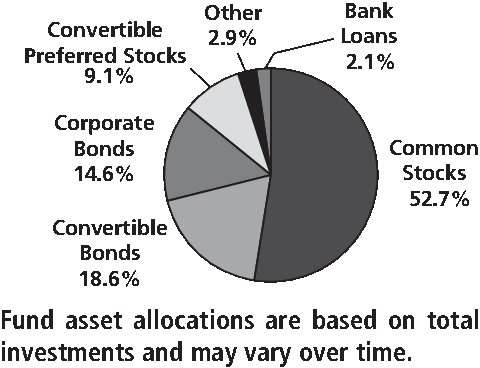What factors influenced performance over the reporting period?
The outbreak of the COVID-19 virus had a devastating impact on financial markets and global economies, as all sectors comprising the MSCI ACWI Index reflected the very challenging conditions. On the policy front, the Federal Reserve took aggressive actions to support the economy and stabilize markets, including an emergency interest rate cut, increased repo operations and significant asset purchases in the open market. From a fiscal perspective, Congress approved a multi-trillion dollar stimulus package with provisions to help individuals, businesses and municipalities. U.S. economic readings indicated the rapid toll on economic activity, with consumer confidence and employment figures heading south following years of improvement over this extended cycle.
The Fund has the ability to invest in a range of strategies including convertible securities, high yield as well as U.S. and global equities. This enables the Fund to participate in a myriad of opportunities on behalf of our shareholders. Given this flexibility, we can attempt to mitigate financial markets’ risk from COVID-19 by adjusting our exposures across these multiple strategies. This flexibility should be helpful as we seek to mitigate risk in vulnerable areas of the financial markets, and take advantage of opportunities in the midst of economic recovery.
The Fund’sU.S. equity sleeve outperformed relative to the S&P 500 Index, as selection in financials (specifically avoiding regional banks) contributed to performance. In addition, our selection and underweight in real estate, namely no exposure to retail REITs, was additive.
Conversely, our selection in industrials (aerospace & defense) impeded performance relative to the index. In addition, our selection and underweight in information technology (specifically in technology hardware, storage & peripherals) was not helpful.
The Fund’sglobal equity sleeve outperformed relative to the MSCI World Index. Our selection and overweight in consumer discretionary, notably in automobile manufacturers, was helpful. Our selection and underweight in financials, namely in diversified banks, also proved beneficial.
Conversely, an overweight in multi-utilities within the utilities sector held back performance. In addition, our selection in information technology, specifically an underweight and selection in systems software,weighed on results.
The Fund’sinternational sleeve outperformed relative to the MSCI EAFE Index. Our overweight and selection in materials, namely gold, was beneficial relative to the index. An overweight and selection in communication services,in interactive home entertainment in particular, was also helpful. From a regional standpoint, an overweight allocation and security selection in the U.S. added value. In addition, the Fund benefitted from favorable security selection in Emerging Asia.
Conversely, an overweight and selection in health care, specifically in pharmaceuticals, impeded performance relative to the MSCI EAFE Index. In addition, our overweight in energy, notably in oil & gas drilling, hindered returns. From a regional perspective, an underweight toward Japan detracted from relative performance. In addition, selection in EMEA lagged.
Convertible Arbitrage entails owning a convertible bond long and then shorting its underlying stock. It is employed as a strategy to enhance returns. The strategy benefitted from increasing volatility, though this benefit was offset somewhat by widening credit spreads. According to Bloomberg Barclays, high yield credit spreads widened from 415 basis points to 766 basis points during the six-month period.









